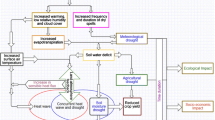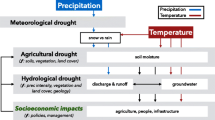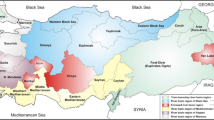Abstract
In arid and semi-arid regions, water scarcity is the crucial issue for crop production. Identifying the spatial and temporal trends in aridity, especially during the crop-growing season, is important for farmers to manage their agricultural practices. This will become especially relevant when considering climate change projections. To reliably determine the actual trends, the influence of short- and long-term memory should be removed from the trend analysis. The objective of this study is to investigate the effect of short- and long-term memory on estimates of trends in two aridity indicators—the inverted De Martonne (ϕIDM) and Budyko (ϕB) indices. The analysis is done using precipitation and temperature data over Iran for a 50-year period (1966–2015) at three temporal scales: annual, wheat-growing season (October–June), and maize-growing season (May–November). For this purpose, the original and the modified Mann–Kendall tests (i.e., modified by three methods of trend free pre-whitening (TFPT), effective sample size (ESS), and long-term persistence (LTP)) are used to investigate the temporal trends in aridity indices, precipitation, and temperature by taking into account the effect of short- and long-term memory. Precipitation and temperature data were provided by the Islamic Republic of Iran Meteorological Organization (IRIMO). The temporal trend analysis showed that aridity increased from 1966 to 2015 at the annual and wheat-growing season scales, which is due to a decreasing trend in precipitation and an increasing trend in mean temperature at these two timescales. The trend in aridity indices was decreasing in the maize-growing season, since precipitation has an increasing trend for most parts of Iran in that season. The increasing trend in aridity indices is significant in Western Iran, which can be related to the significantly more negative trend in precipitation in the West. This increasing trend in aridity could result in an increasing crop water requirement and a significant reduction in the crop production and water use efficiency. Furthermore, the modified Mann–Kendall tests indicated that unlike temperature series, precipitation, ϕIDM, and ϕB series are not affected by short- and long-term memory. Our results can help decision makers and water resource managers to adopt appropriate policy strategies for sustainable development in the field of irrigated agriculture and water resources management.






Similar content being viewed by others
References
Ahmadi H (2008) Applied geomorphology. Tehran, Iran (in Persian)
Allen RG, Pereira LS, Raes D, Smith M (1998) Crop evapotranspiration—guidelines for computing crop water requirements—FAO irrigation and drainage paper 56
Ashraf B, Yazdani R, Mousavi-Baygi M, Bannayan M (2013) Investigation of temporal and spatial climate variability and aridity of Iran. Theor Appl Climatol 118:35–46. https://doi.org/10.1007/s00704-013-1040-8
Aydin M (1995) Water key ingredient in Turkish farming. Forum Appl Res Public Policy 10:68–70
Baltas E (2007) Spatial distribution of climatic indices in northern Greece. Meteo 14:69–78. https://doi.org/10.1002/met
Bannayan M, Sanjani S (2011) Weather conditions associated with irrigated crops in an arid and semi arid environment. Agric For Meteorol 151:1589–1598. https://doi.org/10.1016/j.agrformet.2011.06.015
Bannayan M, Sanjani S, Alizadeh A, Lotfabadi SS, Mohamadian A (2010) Association between climate indices, aridity index, and rainfed crop yield in northeast of Iran. F Crop Res 118:105–114. https://doi.org/10.1016/j.fcr.2010.04.011
Budyko MI (1974) Climate and life. Academic Press, Orlando
Croitoru A, Piticar A, Imbroane AM, Burada DC (2013) Spatiotemporal distribution of aridity indices based on temperature and precipitation in the extra-Carpathian regions of Romania. Theor Appl Climatol 112:597–607. https://doi.org/10.1007/s00704-012-0755-2
de Martonne E (1925) Traité de Géographie Physique. 3 tomes. Paris
Delju AH, Ceylan A, Piguet E, Rebetez M (2013) Observed climate variability and change in Urmia Lake Basin, Iran. Theor Appl Climatol 111:285–296. https://doi.org/10.1007/s00704-012-0651-9
Dinpashoh Y, Mirabbasi R, Asce SM, et al (2014) Effect of short-term and long-term persistence on identification of temporal trends. 617–625. doi:https://doi.org/10.1061/(ASCE)HE.1943-5584.0000819
Eyshi Rezaie E, Bannayan M (2012) Rainfed wheat yields under climate change in northeastern Iran. Meteorol Appl 19:346–354. https://doi.org/10.1002/met.268
Fathian F, Dehghan Z, Bazrkar MH, Eslamian S (2014) Trends in hydrologic and climatic variables affected by four variations of Mann-Kendall approach in Urmia Lake basin, Iran. Hydrol Sci J 6667:140617041244008. https://doi.org/10.1080/02626667.2014.932911
Ghahraman B (2006) Time trend in the mean annual temperature of Iran. Turkish. J Agric For 30:439–448
Ghahraman B (2013) Effect of short- and long-term memory on trend significancy of mean annual flow by Mann-Kendall test. Int J Eng Trans A Basics 26:1155–1168. https://doi.org/10.5829/idosi.ije.2013.26.10a.06
Ghahraman B, Taghvaeian S (2008) Investigation of annual rainfall trends in Iran. J Agric Sci Technol 10:93–97
Hamed KH (2008) Trend detection in hydrologic data: the Mann-Kendall trend test under the scaling hypothesis. J Hydrol 349:350–363. https://doi.org/10.1016/j.jhydrol.2007.11.009
Hamed KH, Rao RA (1998) A modified Mann-Kendall trend test for autocorrelated data. J Hydrol 204:182–196. https://doi.org/10.1016/S0022-1694(97)00125-X
Hargreaves GH, Samani ZA (1985) Reference crop evapotranspiration from temperature. Appl Eng Agric 1:96–99
Heathcote R (1983) The arid lands: their use and abuse. Longman, New York
Hulme M (1996) Recent climatic change in the world’s drylands. Geophys Res Lett 23:61–64
Hurst HE (1951) Long-term storage capacity of reservoirs. Trans Am Soc Civ Eng 116:770–799
IPCC (2013) Climate change 2013: the physical science basis. Contribution of Working Group I to the Fifth Assessment.Stockholm, Zweden
Kendall MG (1975) Rank correlation methods. Charles Griffin, London
Kharel Kafle H, Hendrik JB (2009) Climatic trends in Israel 1970 – 2002 : warmer and increasing aridity inland. Clim Chang 96:63–77. https://doi.org/10.1007/s10584-009-9578-2
Knapp CL, Stoffel TL, Whitaker SD (1980) Insulation solar radiation manual. Solar Energy Research Institute, Golden
Koutsoyiannis D, Montanari A (2007) Statistical analysis of hydroclimatic time series: uncertainty and insights. Water Resour Res 43:1–9. https://doi.org/10.1029/2006WR005592
Kumar S, Merwade V, Kam J, Thurner K (2009) Streamflow trends in Indiana: effects of long term persistence, precipitation and subsurface drains. J Hydrol 374:171–183. https://doi.org/10.1016/j.jhydrol.2009.06.012
Li ZL, Xu ZX, Li JY, Li ZJ (2008) Shift trend and step changes for runoff time series in the Shiyang River basin, northwest China. Hydrol Process 22:4639–4646. https://doi.org/10.1002/hyp.7127
Mann HB (1945) Nonparametric tests against trend. Econometrica 13:245–259
Mckee TB, Doesken NJ, Kleist J (1993) The relationship of drought frequency and duration to time scales. In: Eighth Conference on Applied Climatology, Am Meteorol Soc,. pp 179–186
McKee T, Doesken N, Kleist J (1995) Drought monitoring with multiple time scales. In: Ninth Conference on Applied Climatology, Am Meteorol Soc,. pp 233–236
Mekonnen MM, Hoekstra AY (2016) Four billion people facing severe water scarcity. Sci Adv 2:1–7
Moral FJ, Paniagua LL, Rebollo FJ, Garcia-Martin A (2016) Spatial analysis of the annual and seasonal aridity trends in Extremadura, southwestern Spain. Theor Appl Climatol 130:1–16. https://doi.org/10.1007/s00704-016-1939-y
Muhire I, Ahmed F (2016) Spatiotemporal trends in mean temperatures and aridity index over Rwanda. Theor Appl Climatol 123:399–414. https://doi.org/10.1007/s00704-014-1353-2
Nazemosadat MJ, Cordery I (2000) On the relationships between Enso and autumn rainfall in Iran. Int J Climatol 20:47–61
Nikkath N, Selvaraj S (2016) Trend analysis and estimation of hurst exponent for aerosol time series of chennai. Int J Dev Res 6:8178–8182
Paltineanu C, Tanasescu N, Chitu E, Mihailescu IF (2007) Relationships between the de Martonne aridity index and water requirements of some representative crops : a case study from Romania. Int Agrophysics 21:81–93
Rai RK, Upadhyay A, Ojha CSP (2010) Temporal variability of climatic parameters of Yamuna River basin : spatial analysis of persistence, trend and periodicity. Open Hydrol J 4:184–210
Salas JD (1980) Applied modeling of hydrologic time series. Water Resources Publication, Littleton
Sanjani S, Bannayan M, Kamyabnejad M (2011) Detection of recentclimate change using daily temperature extremes in Khorasan Province, Iran. Clim Res 49:247–254. https://doi.org/10.3354/cr01031
Sayari N, Bannayan M, Alizadeh A, Farid A (2013) Using drought indices to assess climate change impacts on drought conditions in the northeast of Iran (case study: Kashafrood basin). Meteorol Appl 20:115–127. https://doi.org/10.1002/met.1347
Sen PK (1968) Asymptotically efficient tests by the method of n rankings. J R Stat Soc 30:312–317
Shabani B, Mousavi Baygi M, Jabari Noghabi M, Ghareman B (2013) Modeling and prediction of monthly max & min temperatures of Mashhad plain using time series models. J Water Soil 27:896–906 (in Persian)
Shifteh Some’e B, Ezani A, Tabari H (2012) Spatiotemporal trends of aridity index in arid and semi-arid regions of Iran. Theor Appl Climatol 111:149–160. https://doi.org/10.1007/s00704-012-0650-x
Tabari H, Aghajanloo M (2013) Temporal pattern of aridity index in Iran with considering precipitation and evapotranspiration trends. Int J Climatol 33:396–409. https://doi.org/10.1002/joc.3432
Tabari H, Hosseinzadeh Talaee P (2011a) Analysis of trends in temperature data in arid and semi-arid regions of Iran. Glob Planet Chang 79:1–10. https://doi.org/10.1016/j.gloplacha.2011.07.008
Tabari H, Hosseinzadeh Talaee P (2011b) Temporal variability of precipitation over Iran : 1966 – 2005. J Hydrol 396:313–320. https://doi.org/10.1016/j.jhydrol.2010.11.034
Tabari H, Hosseinzadeh Talaee P, Ezani A, Shifteh Some’e B (2011a) Shift changes and monotonic trends in autocorrelated temperature series over Iran. Theor Appl Climatol 109:95–108. https://doi.org/10.1007/s00704-011-0568-8
Tabari H, Shifteh Somee B, Rezaeian Zadeh M (2011b) Testing for long-term trends in climatic variables in Iran. Atmos Res 100:132–140. https://doi.org/10.1016/j.atmosres.2011.01.005
Tabari H, Hosseinzadeh Talaee P, Mousavi Nadoushani SS, Willems P, Marchetto A (2014) A survey of temperature and precipitation based aridity indices in Iran. Quat Int 345:158–166. https://doi.org/10.1016/j.quaint.2014.03.061
Theil H (1950) A rank-invariant method of linear and polynomial regression analysis. Part 3. Springer Netherlands, Dordrecht
Türkes M (2003) Spatial and temporal variations in precipitation and aridity index series of Turkey. Mediterr Clim 181–213
Türkes M, Sümer UM (2004) Spatial and temporal patterns of trends and variability in diurnal temperature ranges of Turkey. Theor Appl Climatol 77:195–227. https://doi.org/10.1007/s00704-003-0024-5
UNEP (1992) World atlas of desertification. Edward Arnold, London
UNFCCC (2007) Climate change: impacts, vulnerabilities and adaptation in developing countries
von Storch H (1995) Misuses of statistical analysis in climate. In: Analysis of Climate Variability: Applications of Statistical Techniques. pp 11–26
Yue S, Hashino M (2003) Temperature trends in Japan : 1900 – 1996. Environment 27:15–27. https://doi.org/10.1007/s00704-002-0717-1
Yue S, Pilon P, Phinney B, Cavadias G (2002) The influence of autocorrelation on the ability to detect trend in hydrological series. Hydrol Process 16:1807–1829. https://doi.org/10.1002/hyp.1095
Zambakas J (1992) General climatology. Department of Geology, National & Kapodistrian University of Athens, Athens
Zhang Q, Xu C, Zhang Z (2009) Observed changes of drought / wetness episodes in the Pearl River basin, China, using the standardized precipitation index and aridity index. Theor Appl Climatol 98:89–99. https://doi.org/10.1007/s00704-008-0095-4
Zhang B, Kang S, Li F, Tong L, Du T (2010) Variation in vineyard evapotranspiration in an arid region of northwest China. Agric Water Manag 97:1898–1904. https://doi.org/10.1016/j.agwat.2010.06.010
Zhao G, Hörmann G, Fohrer N, Zhang Z, Zhai J (2010) Streamflow trends and climate variability impacts in Poyang Lake basin, China. Water Resour Manag 24:689–706. https://doi.org/10.1007/s11269-009-9465-7
Acknowledgements
The authors would like to thank the Islamic Republic of Iran Meteorological Organization (IRIMO) for providing the precipitation and temperature data. Furthermore, we appreciate the help of Hossein Tabari, Edo Abraham, Farshad Fathian, and the anonymous reviewers for their useful comments and suggestions for improving the manuscript.
Funding
This research was partly funded by NWO Earth and Life Sciences (ALW), veni-project 863.15.022, the Netherlands.
Author information
Authors and Affiliations
Corresponding author
Rights and permissions
About this article
Cite this article
Mianabadi, A., Shirazi, P., Ghahraman, B. et al. Assessment of short- and long-term memory in trends of major climatic variables over Iran: 1966–2015. Theor Appl Climatol 135, 677–691 (2019). https://doi.org/10.1007/s00704-018-2410-z
Received:
Accepted:
Published:
Issue Date:
DOI: https://doi.org/10.1007/s00704-018-2410-z




